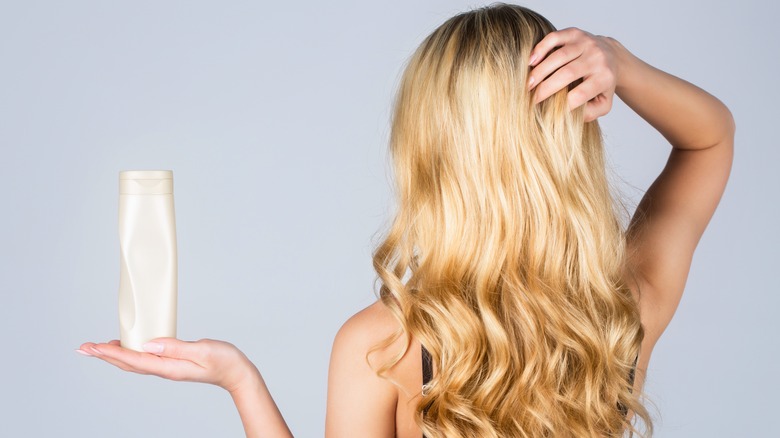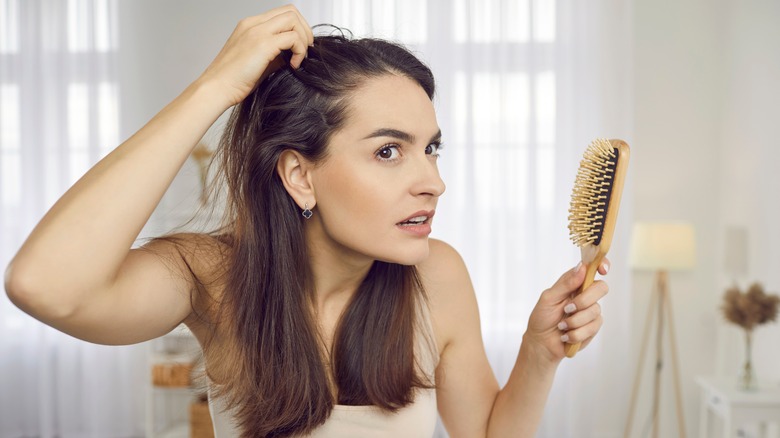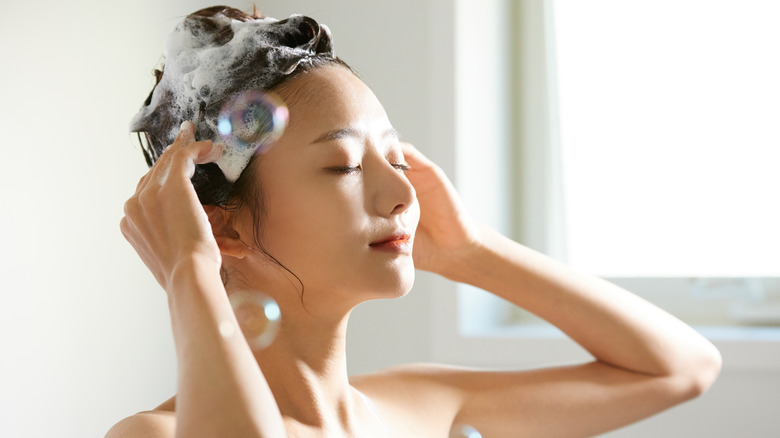How To Know If Antibacterial Shampoo Is Right For You
No matter how dedicated your beauty routine is and how many times you wash your hair, we all get an itchy scalp from time to time. Though the fear of lice may be an initial reaction to an intensely itchy scalp, there are various reasons behind scalp itch.
Common causes include irritants like pollen, smoke, and other environmental pollutants in the air. Sometimes the culprit can be allergies to various shampoos, conditioners, gels, and other hair care products. Itch from hair care products is typically from additives. "The allergen is often fragrance or a moisturizing agent called propylene glycol (PG)," dermatologist Dr. Maria Hordinsky told Women's Health.
Besides allergies, certain medical conditions can cause scalp itch, like psoriasis, diabetes, and shingles, as per Healthline. Yet often, your scalp may be itchy due to dandruff and an antibacterial shampoo may help curb the discomfort. There are some things you should know before trying one out, though.
What antibacterial shampoos do
Antibacterial shampoos are specially formulated to help kill scalp bacteria. Too much bacteria in the scalp can lead to folliculitis, an inflammation of hair follicles, and impetigo, an infection of the skin (via Greatist). Yet the most common cause is dandruff, which can be caused by both bacteria and fungus. Dandruff is often easy to notice. Besides the itch, you may notice white flakes in your hair or even on your clothes.
For this reason, most antibacterial shampoos contain a combination of ingredients that fight both bacteria and fungus, such as triclosan, ketoconazole, zinc pyrithione, and selenium sulfide.
There are various medicated shampoos that require a prescription from your doctor but there are also medicated shampoos you can buy over the counter. The widely known Head & Shoulders brand of medicated shampoo contains zinc pyrithione as well as zinc carbonate to nourish the skin and fight flakes.
However, even though you can easily grab a bottle of antibacterial shampoo in the store, it doesn't mean everyone should use them.
Use antibacterial shampoo sparingly
You likely know not to touch your face too much, but the same should go for our hair. "We need to start thinking of the scalp the same way we think of the skin on our faces," hairstylist Paul Cucinello told Real Simple. "Touching your hair and scalp with unwashed hands is a no-no." There is no need to introduce unnecessary germs and bacteria to your hair and scalp.
Yet there is no reason to medicate your scalp unnecessarily either. If you don't have an itch, irritation or flakes, a regular shampoo will wash out the day's allergens, germs, and dirt.
Stanley Maloy, associate vice president for Research & Innovation at San Diego State University told Insider, "The antimicrobial compounds can kill our beneficial bacteria and, in many cases, also promote antibiotic resistance."
Like the gut, the scalp contains a certain amount of good bacteria that is useful, which we need. "While the idea of killing all of the bacteria that can develop on the scalp might sound tempting, it is a very slippery slope," said Cucinello. "Balance is the key here."


